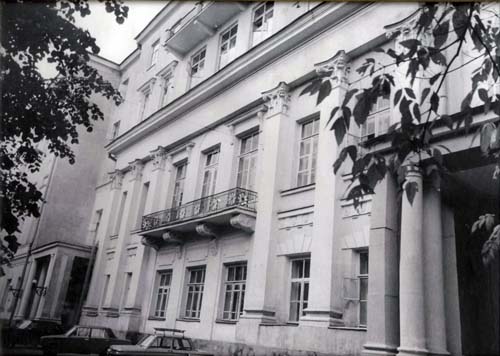In 1936, alongside with the other institutes of the abolished Communist Academy, the Institute of Philosophy was integrated into the Academy of Sciences of the USSR, renamed in 1992 the Russian Academy of Sciences (RAS). It was originally within the Institute of Philosophy that the research groups were formed that subsequently gave birth to some independent institutions of the Russian Academy, such as today’s Institute of Psychology and Institute of Sociology.
At the time of its foundation the Institute of Philosophy was a compact philosophical academy with varying forms of membership. Full members of the Institute’s first faculty were such eminent figures in philosophy and other fields of knowledge as V.F. Asmus, A.I. (Sandor) Varjas, V.P. Volgin, B.I. Gorev, A.M. Deborin, N.A. Karev, I.K. Luppol, D.B. Ryazanov, Ya.E. (Jānis) Stens, A.K. Timiryazev, O.Yu. Schmidt and others. The fellows of the Institute also included notable political activists: V.V. Adoratsky, N.I. Bukharin, P.N. Lepeshinsky, V.I. Nevsky, M.N. Pokrovsky.
Throughout the Soviet period the party authorities regarded the Institute of Philosophy as one of the most important ideological institutions in the country and saw as its principal aim the transformation of the philosophy of dialectical materialism into an ideology that would serve the party’s political goals. In practice, however, this plan never materialized, being incompatible with the creative nature of a free philosophical enquiry. That is why the Institute’s activities often met with discontent from the party leadership, and many of its fellows fell victims of political repression. At the moment of its integration into the Russian Academy of Sciences the Institute’s faculty numbered about 40 members. Since the second half of the 20th century the Institute has become an important centre of study, capable of conducting research on a large scale and in a number of currents in philosophy.
A new and important chapter in the history of the Institute was opened in the years of political “thaw”, when a new group of young philosophers belonging to the “generation of the sixties” entered the “House on Volkhonka” with the idea of giving a new, scientifically and humanistically inspired, reading of Marx’ heritage and of rethinking the basic principles of social philosophy from that standpoint. At the head of this intellectual movement stood E.V. Ilyenkov (1924-1979) and A.A. Zinoviev (1922-2006), both of whom based their work on the methods of logic and dialectics. The individual civic stand these thinkers took was closely connected with their intellectual platform which had its origin in their conviction that the key factor in the transformation of the social reality should above all be the results of research in science and philosophy.
At various times many outstanding philosophers, scholars and academic leaders worked in the Institute or closely collaborated with it; among them P.K. Anokhin, V.F. Asmus, G.S. Batishchev, A.I. Berg, V.V. Bibikhin, S.I. Vavilov, B.A. Grushin, A.V. Gulyga, O.G. Drobnitsky, A.A. Zinoviev, E.V. Ilyenkov, P.L. Kapitsa, B.M. Kedrov, P.V. Kopnin, A.F. Losev, G. Lukács, M.K. Mamardashvili, I.S. Narsky, M.F. Ovsiannikov, A.S. Panarin, S.L. Rubinstein, N.N. Trubnikov, I.T. Frolov, V.S. Shvyrev, O.Yu. Schmidt and others. Today one of the eminent Russian philosophers, Fellow of the Russian Academy T.I. Oisermann, continues his fruitful work at the Institute.
The previous Directors of the Institute were: V.V. Adoratsky (from 1936), P.F. Yudin (from 1939), V.N. Svetlov (from 1944), G.S. Vasetsky (from 1946), G.F. Alexandrov (from 1947), P.N. Fedoseev (from 1955), V.F. Konstantinov (from 1962), P.V. Kopnin (from 1968), B.M. Kedrov (from 1973), B.S. Ukraintsev (from 1974), G.L. Smirnov (from 1983), N.I. Lapin (from 1985), V.S. Stepin (from 1988). In 2006 to the directorship of the Institute was elected A.A. Guseinov, Fellow of the Russian Academy of Sciences.
At the present time there are more than 280 academic collaborators working at the Institute, including nine Fellows of the Russian Academy of Sciences, two Full Members of the Russian Academy of Education, more than 120 Doctors in Sciences. Each year the Institute holds more than 100 conferences; it hosts around 30 permanent theoretical seminars. The chief governing body of the Institute is its Academic Council composed of 40 leading scholars who are elected by secret ballot every five years.
|
|||||
|
    |
|



 As an institution of the Russian Academy of Sciences, the Institute of Philosophy grew from the Institute of Scientific Philosophy founded in 1921 by an outstanding Russian phenomenologist Gustav Shpet (1879–1937). Later on, by the Resolution of the Central Executive Committee of the Union of Soviet Socialist Republics No. 90 from 12 April, 1929, the Institute of Philosophy was granted the status of an independent institution attached to the Communist Academy. One of the principal aims of the Institute at its foundation was the production of a monumental Encyclopaedia of World Philosophy, but this remained unaccomplished owing to the Stalin pogroms on the “philosophical front”.
As an institution of the Russian Academy of Sciences, the Institute of Philosophy grew from the Institute of Scientific Philosophy founded in 1921 by an outstanding Russian phenomenologist Gustav Shpet (1879–1937). Later on, by the Resolution of the Central Executive Committee of the Union of Soviet Socialist Republics No. 90 from 12 April, 1929, the Institute of Philosophy was granted the status of an independent institution attached to the Communist Academy. One of the principal aims of the Institute at its foundation was the production of a monumental Encyclopaedia of World Philosophy, but this remained unaccomplished owing to the Stalin pogroms on the “philosophical front”.
